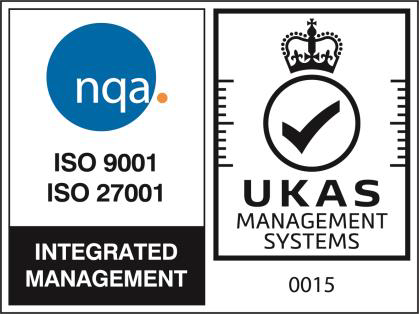Tips Menentukan Cloud Managed Services untuk Startup

Tips Menentukan Cloud Managed Services untuk Startup
Jika startup Anda bergerak di bidang layanan berbasis teknologi, pastinya pengembangan sistem dan aplikasi telah menjadi kegiatan harian tim IT startup Anda. Bahkan, pemeliharaan dan peningkatan kapasitas IT pun mungkin rutin startup Anda lakukan seiring kebutuhan sistem dan aplikasi yang meningkat.
Meskipun biasa dilakukan oleh startup, nyatanya pemeliharaan infrastruktur IT secara rutin tidaklah efisien bagi startup yang tengah berkembang. Hal ini dapat dikatakan mengingat pemeliharaan infrastruktur IT membutuhkan investasi yang tidak sedikit untuk penggantian hardware baru, sehingga startup kerap kali kesulitan untuk mengalokasikan anggaran IT-nya dengan efisien.
Maka dari itu, untuk membantu startup mengelola infrastruktur IT-nya secara fleksibel dan efisien, solusi pun diperlukan. Salah satu yang bisa menjadi pilihan startup adalah penyedia Cloud Managed Service. Dalam peranannya, Cloud Managed Service menjalankan operasional IT bisnis dengan salah satu fokus areanya dapat membantu sebagian atau secara menyeluruh untuk mengoperasikan atau menjamin ketersediaan sistem dari layanan sesuai dengan kebutuhan bisnis. Dengan demikian, startup tetap dapat mengalokasikan sumber daya dan waktunya pada pekerjaan bisnis utama.
Lalu, bagaimana caranya menentukan cloud managed services untuk startup?
1. Availability

(Source: monsitj from Getty Images Pro)
Bisnis Anda mungkin tidak bekerja selama 24 jam, namun network Anda justru terus bekerja sepanjang waktu tersebut. Itulah mengapa, ketika terjadi downtime pada network bisnis Anda, operasional dan layanan bisnis akan ikut terhenti. Jika tidak diminimalisir, downtime ini akan berpengaruh pada ketidakpuasan pelanggan serta hilangnya pendapatan bisnis.
Oleh sebab itu, ketika mencari penyedia Cloud Managed Services, startup perlu memastikan ketersediaan jaringannya bekerja selama 24 jam. Dengan kata lain, startup perlu mencari penyedia layanan cloud dengan SLA 99,9% demi mengoptimalkan layanan bisnis Anda. Selain itu, penyedia Cloud Managed Serviced juga harus proaktif dan tidak hanya merespons ketika Startup mengeluhkan kendala teknis. Itulah mengapa, Startup perlu memilih penyedia Cloud Managed Services yang mampu memonitor sistem, mengidentifikasi, mendiagnosa, dan melakukan troubleshoot pada network bisnis ketika akan terjadi kendala.
2. Reputasi penyedia layanan yang baik

(Source: jirsak from Getty Images Pro)
Dalam menjalankan startup, infrastruktur IT merupakan hal yang paling vital dan sensitif bagi bisnis, mengingat banyak sistem dan data penting yang dikelola di dalamnya. Bila Anda ingin infrastruktur IT bisnis dapat bekerja secara optimal tanpa terjadi hambatan, Anda perlu mengidentifikasi penyedia Cloud Managed Services dengan reputasi yang baik sebelum memilih layanan. Lalu, mengapa hal ini perlu dilakukan?
Ketika menggunakan jasa Cloud Managed Services untuk startup, infrastruktur IT akan dikelola oleh yang ahli sesuai kebutuhan dan permintaan startup. Agar tidak terjadi kendala dan layanan dapat bekerja secara optimal, Anda perlu menentukan penyedia layanan yang memiliki reputasi serta performa terbaik. Sehingga, kebutuhan bisnis pun dapat terpenuhi sesuai keinginan.
3. Keamanan layanan yang diberikan

(Source: anyaberkut from Getty Images Pro)
Sampai kapanpun, serangan siber akan menjadi salah satu ancaman besar bagi bisnis. Cisco Umbrella sendiri melaporkan setidaknya terjadi peningkatan serangan siber sebesar 40% pada pandemi tahun lalu. Tak hanya itu, Security Insider Access Online juga mengemukakan, 60% startup turut menjadi sasaran dari serangan tersebut dalam waktu enam bulan. Bila startup Anda tidak siap akan bahaya ini, tentu keberlangsungan bisnis akan terancam.
Maka dari itu, jika Anda berniat menggunakan jasa Cloud Managed Services untuk startup, ada baiknya Anda memastikan penyedia layanan dapat menguji dan memonitor sistem untuk setiap ancaman keamanan. Dengan demikian, ini akan membantu Anda untuk menjaga dan meminimalisir sistem dari risiko serangan siber.
4. Skalabilitas layanan

(Source: monsitj from Getty Images Pro)
Saat mengembangkan startup, pastinya kebutuhan infrastruktur IT Anda akan ikut meningkat. Agar dapat menyesuaikan kapasitas IT Anda dengan kebutuhan bisnis, maka Anda perlu menskalakan kembali infrastruktur IT Anda.
Memilih jasa Coud Managed Services dengan layanan yang scalable dapat menjadi solusi untuk kebutuhan Anda, sehingga ini akan membantu Anda memenuhi kebutuhan startup. Tak hanya itu, memastikan bahwa penyedia layanan dilengkapi dengan license dan teknologi terbaru juga sangat penting untuk startup. Dengan demikian, ini akan membantu bisnis tetap efisien dan relevan dengan pesaing startup Anda.
5. Tim dukungan 24 x 7

(Source: MangoStar_Studio from Getty Images)
Seperti yang dikatakan di awal, bisnis Anda memang tidak bekerja selama 24 jam. Sebaliknya, network bisnis akan terus beroperasi sepanjang waktu tersebut. Bila layanan atau operasional IT Anda terjadi kendala di luar jam kerja bisnis, pastinya Anda akan membutuhkan bantuan dari penyedia layanan cloud Anda.
Maka dari itu, memilih penyedia Cloud Managed Services dengan tim dukungan selama 24 jam dalam seminggu sangat penting untuk startup Anda. Jadi, ketika Anda membutuhkan bantuan terkait infrastruktur cloud, tim support akan siap membantu selama Anda butuhkan.
Zettagrid Indonesia merupakan salah satu penyedia layanan cloud di Indonesia yang menyediakan Infrastructure as a Service (IaaS) seperti Virtual Data Center (VDC), Virtual Private Server (VPS), Backup as a Service (BaaS), Disaster Recovery as a Service (DRaaS), dan lainnya. Bila Anda memiliki pertanyaan tentang solusi atau keamanan cloud, Anda dapat menghubungi kami di sini atau ke sales@zettagrid.id.






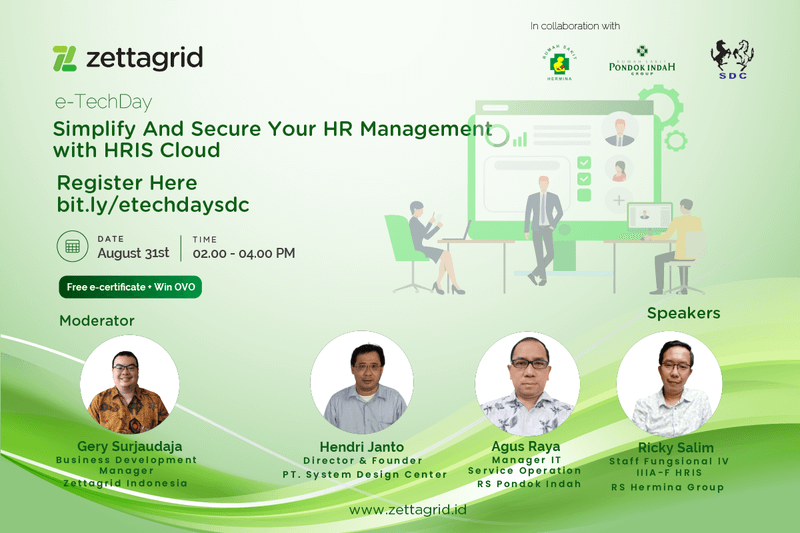




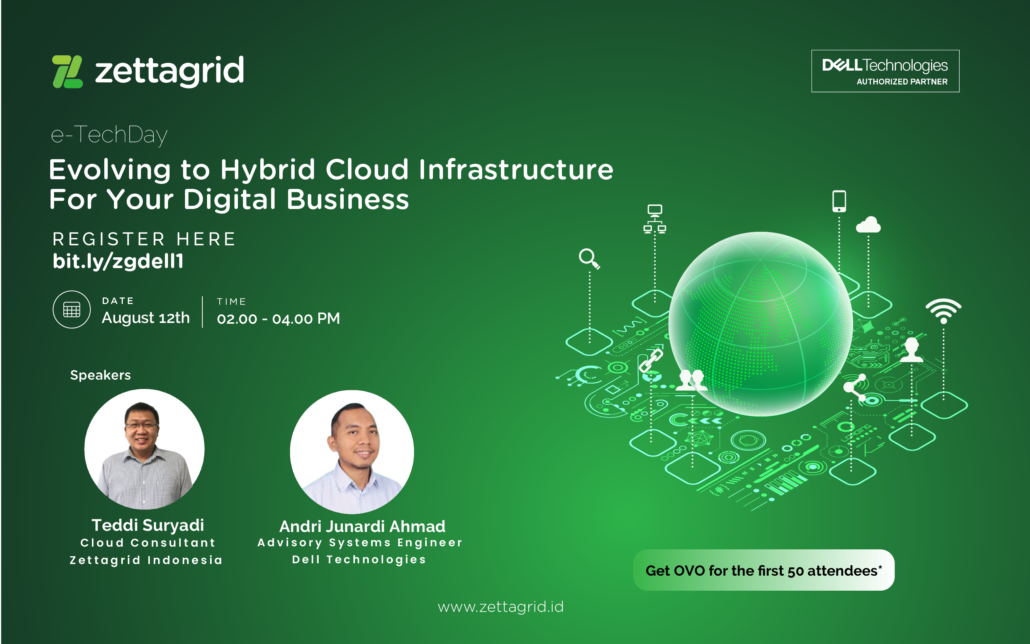 Evolving to Hybrid Cloud Infrastructure For Your Digital Business
Evolving to Hybrid Cloud Infrastructure For Your Digital Business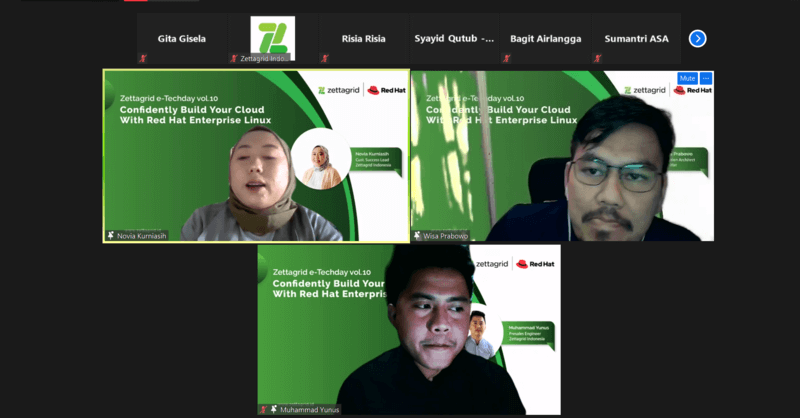 2 Things To Know About Red Hat Enterprise Linux Subscription
2 Things To Know About Red Hat Enterprise Linux Subscription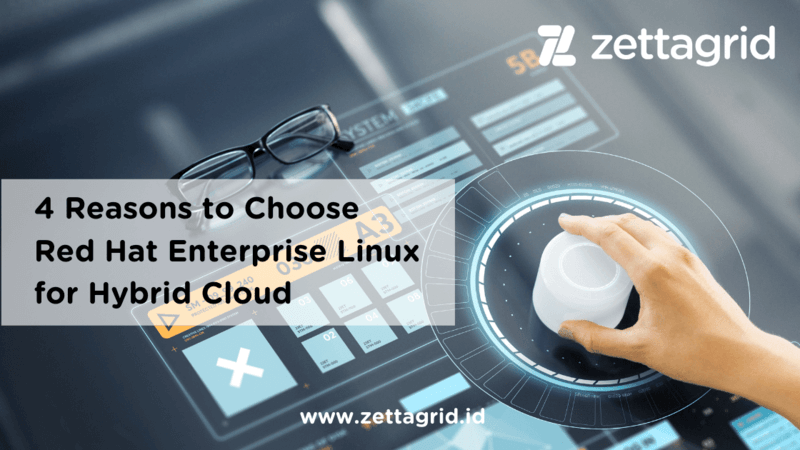 4 Reasons to Choose Red Hat Enterprise Linux for Hybrid Cloud
4 Reasons to Choose Red Hat Enterprise Linux for Hybrid Cloud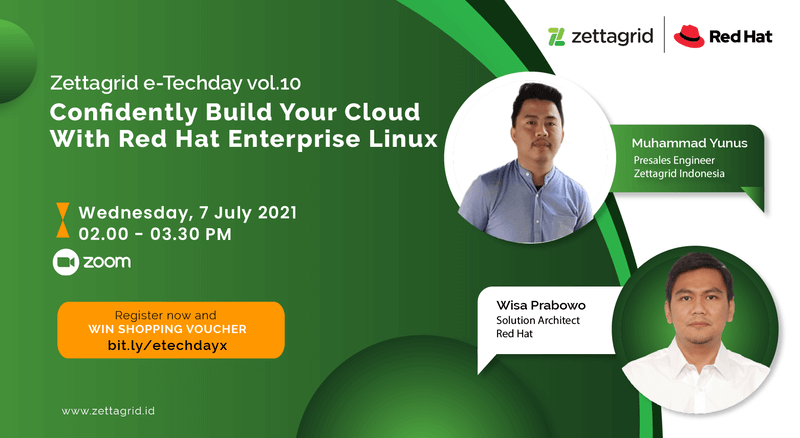 Confidently Build Your Cloud With Red Hat Enterprise Linux
Confidently Build Your Cloud With Red Hat Enterprise Linux




